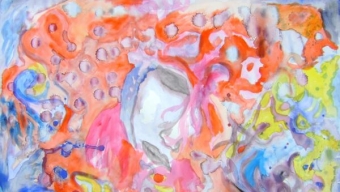Kytka’s Picks: August, 2002
As a Leo, I used to find myself struggling with issues of ego. I speak out freely, oftentimes straight from the heart without much thought to how people may perceive what I have to say. I received this wonderful message from Christopher Robbins and he allowed me to re-post it here for your consideration & inner working. Enjoy!
Precisely because the ego, the soul, and the Self can all be present simultaneously, we can better understand the real meaning of “egoless ness,” a notion that has caused an inordinate amount of confusion. But egoless ness does not mean the absence of a functional self (that’s a psychotic, not a sage); it means that one is no longer exclusively identified with that self.
One of the many reasons we have trouble with the notion of “egoless” is that people want their “egoless sages” to fulfill all their fantasies of “saintly” or “spiritual,” which usually means dead from the neck down, without fleshy wants or desires, gently smiling all the time. All of things that people typically have trouble with–money, food, sex, relationships, desires–they want their saints to be without. “Egoless sages” are “above all that,” is
{+++}
what people want. Talking heads, is what they want. Religion, they believe, will simply get rid of all baser instincts, drives, and relationships, and hence they look to religion, not for advice on how to live life with enthusiasm, but on how to avoid it, repress it, deny it, escape it.
In other words, the typical person wants the spiritual sage to be “less than a person,” somehow devoid of all the messy, juicy, complex, pulsating, desiring, urging forces that drive most human beings. We expect our sages to be an absence of all that drives us! All the things that frighten us, confuse us, torment us, confound us: we want our sages to be untouched by them all together. And that absence, that vacancy, that “less than personal,” is what we often mean by “egoless.”
But “egoless” does not mean “less than personal,” it means “more than personal.” Not personal minus, but personal plus–all the normal personal qualities, plus some transpersonal ones. Think of the great yogis, saints, and sages–from Moses to Christ to Padmasambhava. They were not feeble-mannered milquetoasts, but fierce movers and shakers–from wielding bullwhips in the Temple to subduing entire countries. They rattled the world on its own terms, not in some pie-in-the-sky piety; many of them instigated massive social revolutions that have continued for thousands of years. And they did so, not because they avoided the physical, emotional, and mental dimensions of humanness, and the ego that is their vehicle, but because they engaged them with a drive and intensity that shook the world to its very foundations.
No doubt, they were also plugged into the soul and spirit–the ultimate source of their power–but they expressed that power, and gave it concrete results, precisely because they dramatically engaged the lower dimensions through which that power could speak in terms that could be heard by all.
These great movers and shakers were not small egos; they were, in the very best sense of the term, big egos, precisely because the ego can and does exist alongside the soul and the Self. To the extent these great teachers moved the gross realm they did so with their egos, because the ego is the functional vehicle of that realm. They were not, however, identified merely with their egos (that’s a narcissist), they simply found their egos plugged into a radiant Cosmic source.
The great yogis, saints, and sages accomplished so much precisely because they were not timid little toadies but great big egos, plugged into the dynamic Ground and Goal of the Cosmos itself, plugged into their own higher Self, alive to the pure Atman (the pure I-I) that is one with Brahman; they opened their mouths and the world trembled, fell to its knees, and confronted its radiant God.
Saint Teresa was a great contemplative? Yes, and Saint Teresa is the only woman ever to have reformed an entire Catholic monastic tradition (think about it). Gautama Buddha shook India to its foundations. Rumi, Plotinus, Bodhidharma, Lady Tsogyal, Lao Tzu, Plato, the Baal Shem Tov–these men and women started revolutions in the gross realm that lasted hundreds, sometimes thousands, of years, something neither Marx nor Lenin nor Locke nor Jefferson can yet claim. And they did not do so because they were dead from the neck down. No, they were monumentally, gloriously, divinely big egos, plugged into a deeper psychic, which was plugged straight into God.
There is certainly a type of truth to the notion of transcending ego: it doesn’t mean destroy the ego, it means plug it into something bigger. (As Nagarjuna put it, in the relative world, atman is real; in the absolute, neither atman nor an atman is real.) The small ego does not evaporate; it remains as the functional center of activity in the conventional realm. As I said, to lose the ego is to become a psychotic, not a sage.
But we do not want our sages to have big egos; we do not even want them to display a manifest dimension at all. Anytime a sage displays humanness–in regard to money, food, sex, relationships–we are shocked, shocked, because we are planning to escape life altogether, not live it, and the sage who lives life offends us.
We want out, we want to ascend, we want to escape, and the sage who engages life with gusto, lives it to the hilt, grabs each wave of life and surfs it to the end–this deeply, profoundly disturbs us, frightens us, because it means that we, too, might have to engage life, with gusto, on all levels, and not merely escape it in a cloud of luminous ether.
We do not want our sages to have bodies, egos, drives, vitality, sex, money, relationships, or life, because those are what habitually torture us, and we want out. We do not want to surf the waves of life, we want the waves to go away. We want vaporware spirituality. The integral sage, the non-dual sage, is here to show us otherwise.
Known generally as “Tantric,” these sages insist on transcending life by living it. They insist on finding release by engagement, finding nirvana in the midst of samsara, finding total liberation by complete immersion. They enter with awareness the nine rings of hell, for nowhere else are the nine heavens found. Nothing is alien to them, for there is nothing that is not One Taste.
Indeed, the whole point is to be fully at home in the body and its desires, the mind and its ideas, the spirit and its light. To embrace them fully, evenly, simultaneously, since all are equally gestures of the One and Only Taste. To inhabit lust and watch it play; to enter ideas and follow their brilliance; to be swallowed by Spirit and awaken to a glory that time forgot to name. Body and mind and spirit, all contained, equally contained, in the ever-present awareness that grounds the entire display. In the stillness of the night, the Goddess whispers. In the brightness of the day, dear God roars.
Life pulses, mind imagines, emotions wave, thoughts wander. What are all these but the endless movements of One Taste, forever at play with its own gestures, whispering quietly to all who would listen: is this not you yourself? When the thunder roars, do you not hear your Self? When the lightning cracks, do you not see your Self? When clouds float quietly across the sky, is this not your very own limitless Being, waving back at you?
A good rule of thumb is that people are not going to expand their present views or outlooks by much more than 5% at any given time. So if you are trying to push a very big picture at them, they are probably going to shut down, and maybe get angry, and then start calling you names–you lack compassion, your arrogant, etc. If you keep pushing, then at that point it really is your problem. Maybe your ego is enjoying shoving this down their throats. I know I’ve done that on occasion, and it helps nothing. Anyway, if you are really trying to help–real compassion–then don’t put more in the spoon then can be swallowed, yes?
Also remember that belief systems are not merely beliefs–they are the home of the ego, the home of the self-contraction.
Even a holistic belief, like the web-of-life, always houses the ego, because beliefs are merely mental forms, and if the supramental has not been discovered, then any and all mental constructions house a tenacious ego. When you challenge any belief system, the separate-self experiences that as a death threat and a death seizure, and this will engage all its survival instincts. You are not just discussing the truth or falsity of a theory–you are engaged in a life and death struggle. Whenever we do this, we’re dealing with a cornered rat–in others and ourselves, so watch out.
~ Special Thanks to Christopher Robbins for sharing his wonderful insight!





















